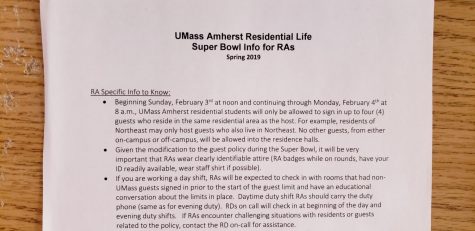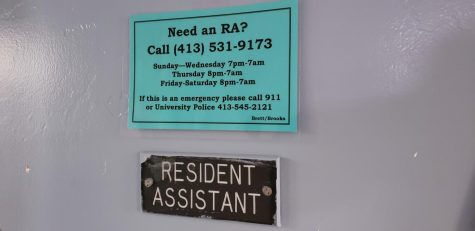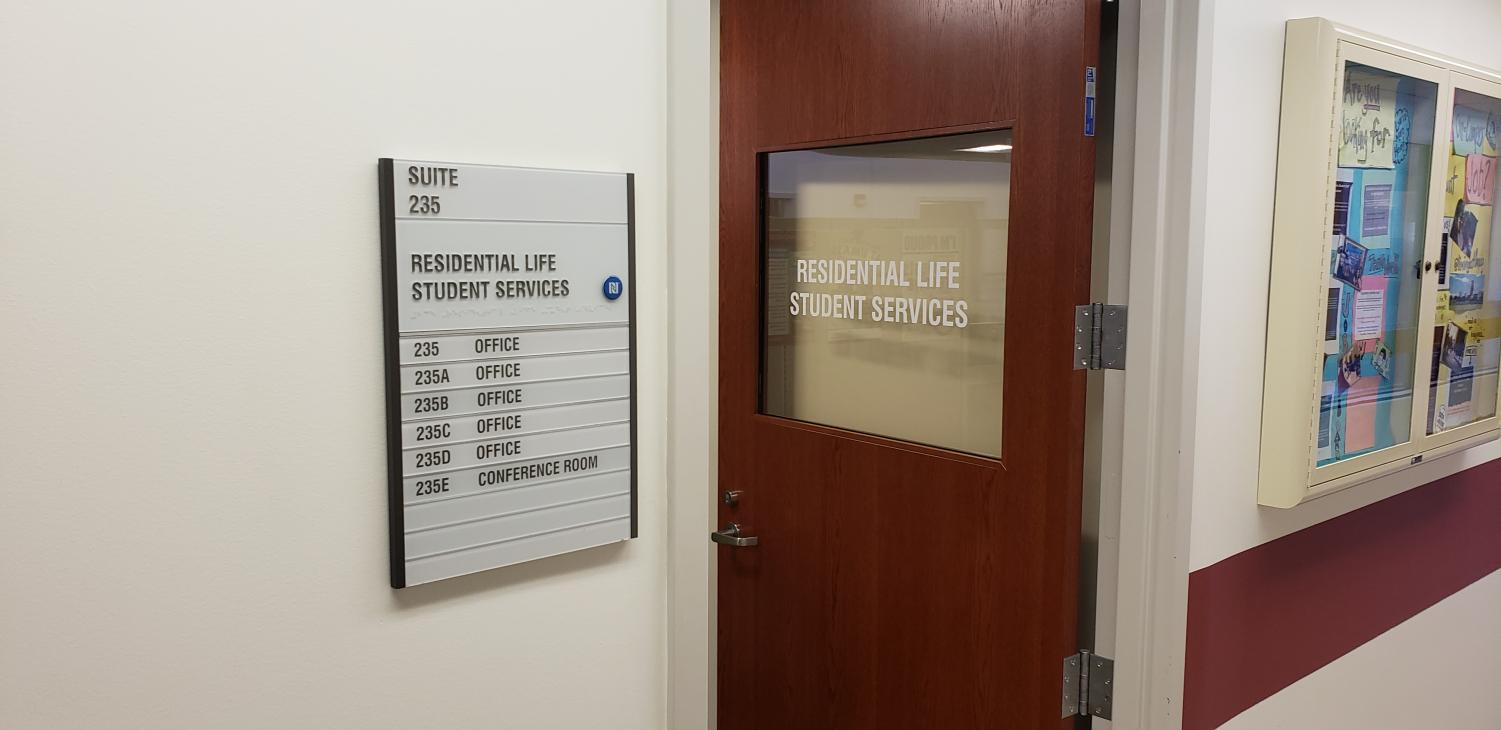The fight for a fair contract: UMass versus its RAs & PMs
RAs and PMs want one thing - to feel like valued employees.
February 11, 2019
Disclaimer: Sifa Kasongo, a managing editor and currently employed peer mentor at UMass Amherst, did not contribute to this report. Additionally, names of sources have been changed to protect anonymity.
Last Friday, in response to a cancelled bargaining session, unionized resident assistants and peer mentors at the University of Massachusetts Amherst sent out a press release demanding that a fair contract be restructured between its union, United Auto Workers 2322, and the university’s Residential Life administration.
“The Resident Assistant and Peer Mentor Union (RAPMU) has been in contract negotiations since December 2017 and is consistently disrespected by the University’s bargaining team, who are often late to bargaining meetings,
cancel meetings last minute, go long periods of time without bargaining, and fail to provide
information relevant to negotiations,” the press release reads.
The cancellation and subsequent complaint by the union is the latest in a long series of contract clashes between resident assistants, peer mentors and Residential Life.
Since resident assistants at UMass became the nation’s first undergraduate labor union in 2002, the university’s Residential Life administration has bargained bitterly with the union over student staff contracts. Negotiations are often kept under wraps, and ResLife discourages student staff from speaking publicly about those negotiations.
When the most recent contract expired on July 1, the back-and-forth began again.
In the wake of ongoing negotiations, several resident assistants (RAs) and peer mentors (PMs) have agreed to speak with Amherst Wire’s special projects team about proposed changes to the contract – from requiring RAs to wear uniforms and extending duty hours on weeknights, to continuing opposition of free rooms for PMs.
Names of student staff who spoke to Wire staff have been changed due to contractual restrictions they have with ResLife. Most expressed skepticism toward their employer and the true intentions behind proposed contract changes.
“The University always tries to see what they can get out of us,” said John, a PM who is stationed in Southwest. “And ResLife is kind of dirty — they try to take what they can. If they can get work out of you without paying you money, they will. And if they can give you more work, without giving you more money, they will.”
“In our contract, it states that we’ll give you a room, an amount of money, and in return, you will be doing a list of things for us,” continued John. “Then, they ask us to do things outside of the contract, but they don’t pay you more…It’s just one battle out of more to come.”

Edward Blaguszewski, the university’s executive director of strategic communications, sent the following statement to Wire editor-in-chief Henry Brechter on December 10:
“The university has been bargaining in good faith with the Resident Assistant/Peer Mentor union for about one year, holding approximately 20 bargaining sessions. The contract expired on July 1, 2018. We remain cautiously optimistic about reaching a settlement.”
Student staff were clear that both pay raises and pay cuts had been discussed as part of the ongoing negotiations, but were clear that they aren’t usually informed enough to know the specifics of those discussions.
Saloonee Adhikari, an RA and one of three co-chairs of the bargaining unit that represents the RAs, shed light on specific changes that have been discussed recently.
“ResLife wants to extend duty hours on weekdays until the next morning, they want to require uniforms, they don’t want to pay more,” said Adhikari. “They also don’t want free rooms for the PMs, and they don’t want relationships to occur between RAs and PMs within the same area.”
The topic of uniforms has been especially debated. Susie, an RA in Orchard Hill, sees the idea as more harmful than helpful.
“There’s been rumors back and forth about uniform for the past years. I think it’s kind of silly,” said Susie. “All the people who wear uniforms on campus like police officers, securities, cadets; they all receive some sort of special training to deal with students that are agitated.”
“You’re not there to be a force, you’re there to be a resource.”

The union has also been working to assist RAs when they’re being investigated of a breach of contract, which oftentimes carries heavy consequences.
“You’re called to a formal meeting if a supervisor finds you doing anything against the contract,” said Adhikari. “This can happen even if I miss a training session, or if I don’t do my bulletin boards.”
“Basically, it’s a meeting where you tell your side of the story. The supervisors meet and decide if they want to give you a warning, probation, or fire you.”
The union can only do so much to protect RAs and PMs. Max, a senior RA stationed in Northeast, said he once falsely told ResLife he was sick for a whole week to continue working at his summer internship and avoid being prosecuted for missing RA training sessions.
“It’s ridiculous how ResLife thinks that your job as an RA should be your number one concern,” said Max. “Obviously you’re in school to be a student and gain career experience first, and to think I’d skip my internship to come back for a few training sessions really shows ResLife’s lack of caring.”
An email sent by Trevor Dority, the residence director in Southwest’s James/Emerson cluster, detailed the policy for applying to miss Spring 2019 training sessions in a November 16th email sent to all RAs on campus.
“If you need to request to miss any part of training, you will need to complete a Request to Miss Training letter by Saturday, December 15th to your supervisor. If you submit your request after this date, the request may be considered, but are not likely to be approved.”
The 2018-19 “Memorandum of Understanding” that all RAs must sign says requests to miss training “are only considered for academic courses, personal injury or illness, or extenuating circumstances.” The memorandum for PMs uses the same language.
Similar rules apply to RAs and PMs when they miss scheduled staff meetings. On a different occasion, Max was called into an investigative meeting after missing a scheduled one-on-one talk with his boss.
“They really try to intimidate you into admitting that you’re wrong,” said Max of ResLife. “If I didn’t have the union representative there to help me, it could have turned out a lot differently.”
“It’s easy to tell that the union is able to get under ResLife’s skin.”
Unionization of RAs at UMass was controversial from its outset. The original decision to certify the union met heavy push-back from the university, which led to days of sit-ins and protests in early 2002 that saw nearly 40 arrests.
Then-Chancellor Marcellette G. Williams issued a campus-wide statement two months later titled, “Why a Union for RAs Makes No Sense.”
“My first thought is that [the decision to unionize] simply defies common sense,” wrote Williams. “I fear that their unionization would inevitably lead to demands that we bargain over matters that are entirely inappropriate subjects for union negotiations, such as financial aid, academic status, student conduct and discipline, and dormitory conditions and regulations.”
Williams went on to criticize the United Auto Workers Local 2322 and its tough bargaining nature. More than 15 years later, the same union continues to represent both RAs and PMs – who won union representation in 2012 – and negotiate on their behalf. And while resistance from the university has been toned-down, it remains adamant.
“If the university had its own way, it wouldn’t want to let us be unionized,” said Adhikari. “It took a long time. When the university wouldn’t let us become one, we weren’t a strong enough entity. But obviously, as the university grows, the RAs and PMs are growing too.”
The most recent Collective Bargaining Agreement between the University and Local 2322 was confirmed with 99 percent support of those who voted. Still, many RAs and PMs aren’t involved with the union and don’t necessarily feel like it always works with student staff in mind.
“A lot of the union meetings are on late nights and weekends, and that’s not exactly convenient,” said Susie. “I know they take money out of my paycheck every month, but besides sending me emails a few times a month, there’s not a whole lot of outreach.”
“Every year they basically fight with the university for a better contract for us, and some of it makes a lot of sense. The union says you can’t make people work past their contract, but sometimes the union asks for a lot, so there’s always a give and take.”
“It’s a waste of time,” added John of participating in the union. “But they do make changes, I won’t deny that.”
While RAs and PMs have differing opinions on the union’s functionality, their attitude toward ResLife seems to be universal – they don’t feel like valued employees, and ResLife’s proposed contract changes reflect that.
“It really seems like ResLife applies a one-size-fits-all type of approach to rules, which isn’t fair to RAs or their residents,” said Max.
“ResLife really just tries to save its own a** and make sure it isn’t liable if anything goes wrong, and that comes at our expense.”
